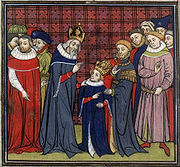
Vita Hludovici
Encyclopedia

Louis the Pious
Louis the Pious , also called the Fair, and the Debonaire, was the King of Aquitaine from 781. He was also King of the Franks and co-Emperor with his father, Charlemagne, from 813...
, Holy Roman Emperor
Holy Roman Emperor
The Holy Roman Emperor is a term used by historians to denote a medieval ruler who, as German King, had also received the title of "Emperor of the Romans" from the Pope...
and King of the Franks from AD 814
814
Year 814 was a common year starting on Sunday of the Julian calendar.- Europe :* Charlemagne dies in Aachen, aged 67 or 72...
to 840
840
Year 840 was a leap year starting on Thursday of the Julian calendar.-Europe:* After the death of Louis the Pious, his sons Lothar, Charles the Bald and Louis the German fight over the division of the Holy Roman Empire, with Lothar succeeding as Emperor.-Asia:* Tang Wu Zong succeeds Tang Wen Zong...
.
Author
The work was written in Latin in or soon after AD 840 by an anonymous author who is conventionally called Astronomus , the Astronomer or sometimes the LimousinLimousin (province)
Limousin is one of the traditional provinces of France around the city of Limoges. Limousin lies in the foothills of the western edge of the Massif Central, with cold weather in the winter...
Astronomer. This is due to his many detailed comments on astronomical
Astronomy
Astronomy is a natural science that deals with the study of celestial objects and phenomena that originate outside the atmosphere of Earth...
matters in the work upon which he describes himself as "one credited with having knowledge of this subject." He held office at the court of Louis the Pious, and his cultural and religious references suggest that he was not a churchman. It has been conjectured, based on evidence within the text, that the author was born around AD 800 and that his nationality was not Gothic
Goths
The Goths were an East Germanic tribe of Scandinavian origin whose two branches, the Visigoths and the Ostrogoths, played an important role in the fall of the Roman Empire and the emergence of Medieval Europe....
or Frankish
Franks
The Franks were a confederation of Germanic tribes first attested in the third century AD as living north and east of the Lower Rhine River. From the third to fifth centuries some Franks raided Roman territory while other Franks joined the Roman troops in Gaul. Only the Salian Franks formed a...
.
The author's attitude to his subject is clearly subordinate and one of admiration, yet he does not idealise Louis in the same way as, for example, Einhard
Einhard
Einhard was a Frankish scholar and courtier. Einhard was a dedicated servant of Charlemagne and his son Louis the Pious; his main work is a biography of Charlemagne, the Vita Karoli Magni, "one of the most precious literary bequests of the early Middle Ages."-Public life:Einhard was from the eastern...
does in his Life of Charlemagne. It has been suggested that the author exhibits a degree of disapproval towards clerics and the workings of the Frankish Church, lending weight to the view that he was not formally connected to the Church. Nevertheless, the most popular recent ideas (see below) do identify him as a cleric.
Identification

Hilduin
Hilduin was Bishop of Paris, chaplain to Louis I, reforming Abbot of the Abbey of St. Denis and an author.-Background:...
, the chancellor of Pippin II and Charles the Bald
Charles the Bald
Charles the Bald , Holy Roman Emperor and King of West Francia , was the youngest son of the Emperor Louis the Pious by his second wife Judith.-Struggle against his brothers:He was born on 13 June 823 in Frankfurt, when his elder...
. Ernst Tremp supports this view in his important 1995 study, although Buchner and Tremp differ by about a decade in their dating of the work. Tischler has most recently tried to make a case that the Astronomer was Jonas of Orleans
Jonas of Orléans
Jonas was Bishop of Orléans and played a major political role during the reign of Emperor Louis the Pious.Jonas was born in Aquitaine. Probably a cleric by the 780s, he served at the court of Louis the Pious, who ruled as King of Aquitaine during the reign of his father, Charlemagne. In 817,...
but the Hilduin theory remains more popular amongst historians.
External links
- Full text in Latin from Tremp's 1995 edition.
- Selected text in English on the siege of BarcelonaBarcelonaBarcelona is the second largest city in Spain after Madrid, and the capital of Catalonia, with a population of 1,621,537 within its administrative limits on a land area of...
from P.D. King's 1989 edition.

